Cooper King Distillery: Meet the young couple who created Yorkshire's first carbon zero malt whisky
Best known for its gin and collaborations with restaurants such as the Black Swan at Oldstead, Roots and Skosh in York, owners of Cooper King Distillery, Abbie and Chris Jaume, have done what they originally set out to do ten years ago – make whisky.
It was October 2013 when the couple handed in their notice and went backpacking to Australia – a trip that would change the course of their lives.
Advertisement
Hide AdAdvertisement
Hide AdAbbie, a scientist, and Chris an architect, met at Newcastle University and decided to quit their jobs to travel in a bid to get inspiration for a business they could run together. Whisky drinkers themselves, it was while travelling in Tasmania that the young couple became fascinated by the country’s eight operational whisky distilleries.
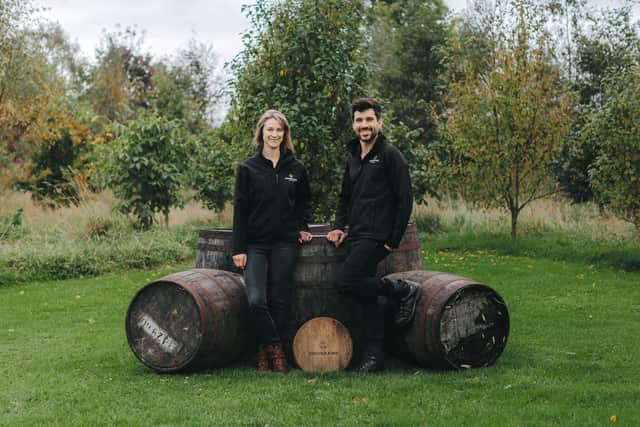

“We thought if they can create something so amazing in Tasmania why can’t we do it in England?” explains Abbie. They spent time learning from the Tasmanian distillers before heading back to England and spending two years researching and creating a business plan. Abbie also embarked on a distilling course.
They eventually took up Abbie’s father’s offer of converting a former stables on land owned by her grandmother, in Sutton-on-the-Forest, near York, where she grew up.
“We spent the deposit we’d saved to buy our first home together, but that only covered the driveway,” says Chris, whose great-great grandfather, Charles Cooper King, inspired the name for the distillery and even the coat of arms on its label. So they reached out to potential investors to enable them to build the distillery with the green credentials they were passionate about. It enabled them to finish their distillery, order their specially-shaped still from Tasmania and other equipment they needed.
Advertisement
Hide AdAdvertisement
Hide AdBy that time, it was 2016 and the gin revival was in full swing. “We never intended to make gin. But people kept asking for it and so we thought why not?” They started producing their gin in May 2018 using honey from Abbie’s dad’s bees and lavender from a nearby farm. When I first met them in 2019 they admitted the gin business had distracted them a little from their initial intention. “It did put us behind where we had planned to be but whisky is all about patience and the success of the gin allowed us to invest in the whisky,” says Abbie.
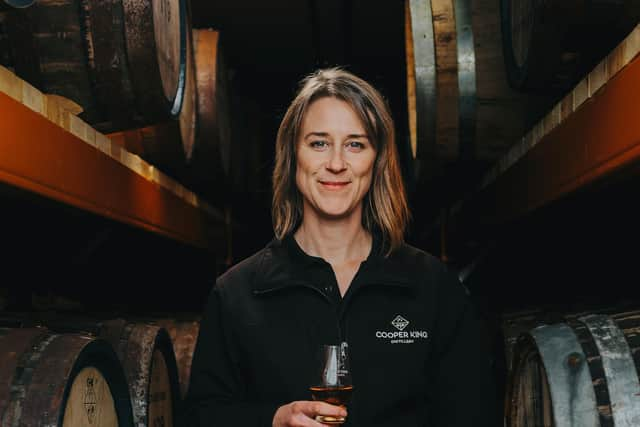

And that patience has paid off with the first 589 bottles produced selling out in less than ten minutes of being released to the general public last month.
“It’s been very emotional,” adds Chris. “To hear what people are saying about something you have spent literally ten years of your life creating means such a lot.”
The inaugural whisky, First Edition – Fruit + Spice, is the first release in their Expedition Series. But for this couple, who married this August and have moved out of the caravan they called home on the site for five years, the gin and the whisky are just half the story.
Advertisement
Hide AdAdvertisement
Hide AdSustainability and a desire to reduce their carbon footprint to below zero, underpins everything they have done from the very beginning – as well as transparency. As well as their new whisky their two core gins are carbon negative.
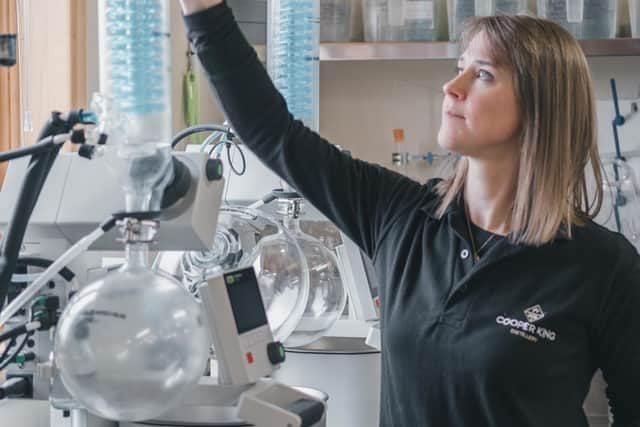

They now give regular talks to other businesses looking to reduce their carbon footprint, work with the University of York to help other organisations reduce their carbon footprint and even found themselves in front of the European Parliament on what Chris describes as “the most intimidating Zoom call ever”.
And there was also an unexpected bonus to their business.
“When we announced the news about the gins being carbon negative it went bonkers. Business just exploded,” says Chris. “We had the buyer for Selfridges ring up and ask if we could make a gin for them, The Natural History Museum called to ask if we could make their first ever sprit.”
Sustainability is at the core of everything Abbie and Chris do.
Advertisement
Hide AdAdvertisement
Hide Ad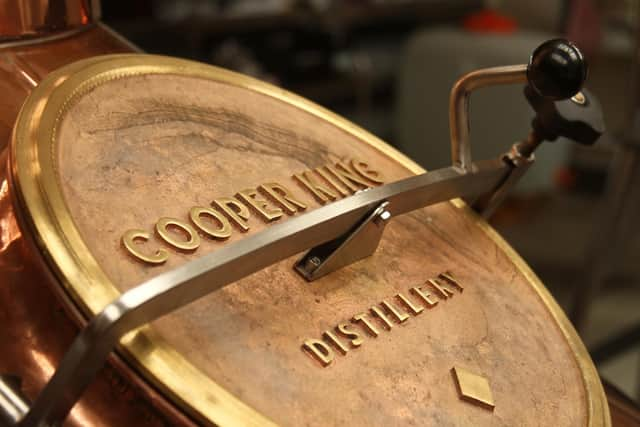

The self-built, award-winning distillery has been powered by 100 per cent renewable energy since distillation began, as well as investment in energy efficiency, including a pioneering insulating paint, developed for NASA, which coats the custom-built 900-litre Tasmanian copper pot still, achieving a 21 per cent reduction in energy use.
They are also a member of the international environmental initiative, One Per Cent for the Planet. Through its membership, the company plants one square metre of native English woodland for every bottle of gin sold through a partnership with the Yorkshire Dales Millennium Trust and they have pledged to donate £5 from every bottle of the First Edition (and future releases) to Yorkshire Dales Millennium Trust (YDMT) to fund life-changing apprenticeships for young people in rural areas, to help protect vital UK habitats.
Work undertaken by apprentices includes restoring and protecting precious habitats, including Yorkshire peatlands, to safeguard natural carbon storage. Cooper King aims to raise £17,250 for YDMT in the next 12 months.
Their philanthropy doesn’t end there. During lockdown, when 70 per cent of their trade sales dried up, they were the first company in Yorkshire to make and give away hand sanitiser for free.
Advertisement
Hide AdAdvertisement
Hide Ad“We had queues of cars of people wanting to have it. We ended up donating to 60 organisations and schools across the country but we quickly realised if we kept giving it away we’d end up going bust. We decided to sell it to businesses which would then allow us to give it free to charities. We got a contract with York-based family owned Pavers to supply all their stores which funded the donations.”
They also developed a sharing box which could be delivered through the post and people could hold their own at-home gin tasting as they were unable to visit the distillery.
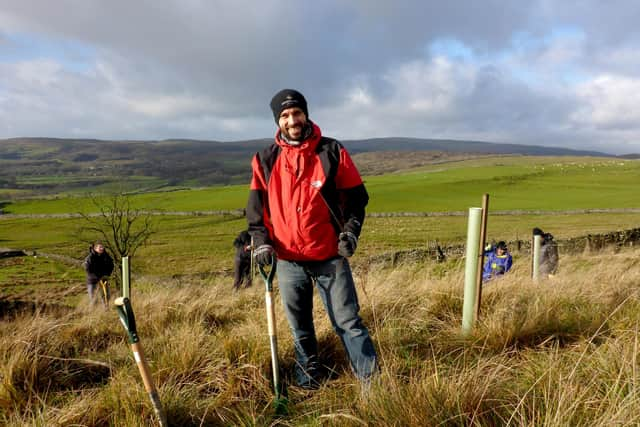

Through all this the whisky was maturing thanks to Abbie and their distiller Sophie Pashley – (they now employ 11 people). “We thought initially it would take three to five years in the casks but it was really just trial and error,” says Abbie. “So we’ve been tasting the spirit, trying lots of different things. We were finding our spirit was tasting really good after about three years and so our current release is about three and a half years which is relatively young for a malt whisky.”
Chris adds: “It seems mad we have been working on this for ten years since we gave up our jobs. Having the gin sustain the business and fund the whisky production meant we weren’t pressured to release the whisky early for cash flow reasons and could wait until we were really happy with the product.”
Advertisement
Hide AdAdvertisement
Hide AdIts lightweight bottles are made from 55 per cent recycled glass, biodegradable cellulose tampers, innovative stoppers derived from renewable sugar cane and labels printed on FSC certified paper, designed by Yorkshire-based designer, James Everitt.
The distillery’s second whisky release is due in spring 2024. Their first whisky is a big milestone on Abbie and Chris’s journey – but it is just the beginning of their journey. They have big plans for the future but one thing is certain sustainability and their impact on the planet will remain at the heart of everything.